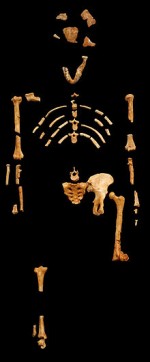Climate science challenged but strong
 These are hard times for those of us working on climate change – scientists, environmentalists, policymakers and others. The breathless rumours about the death of climate change science from denialists are not only premature, however, they are contrary to what anyone working in the field knows and understands. The real question is whether we will embrace the science in time to prevent catastrophe.
These are hard times for those of us working on climate change – scientists, environmentalists, policymakers and others. The breathless rumours about the death of climate change science from denialists are not only premature, however, they are contrary to what anyone working in the field knows and understands. The real question is whether we will embrace the science in time to prevent catastrophe.
I was studying Anthropology at the University of Toronto in the early 1980s. At that time, Richard Leakey and Donald Johanson were embroiled in a bitter feud about the significance of Australopithecus afarensis. Johanson had found remains of the 3.2 million year old hominid and was sure that it was a human ancestor. Leakey was initially unwilling even to acknowledge that it deserved its own species name. Johanson was still fighting off accusations of professional misconduct because he publicized his findings in a popular magazine and gave the specimen the catchy name “Lucy” before submitting his research to peer-review. Some old textbooks that we used still referred to Piltdown Man, which had been revealed as a fraud four decades before.
In those days, creationists hyperventilated about how the science of evolution was corrupt, conflicted and contrary and missing critical evidence. Any moment we were all going to realize the whole field was a hoax and return to our biblical creationist beliefs. Yet paleontologists continued on and emerged respected for their work. Few people even remember that Lucy was supposed to be a gift to creationists. She sits today in a museum in Ethiopia, proudly recognized as an early member of the human family.
So all of this seems very familiar to me.
There is nothing in climate science that is remotely as controversial as paleontology was then. Success in paleontology truly depended on spectacular finds so there was tremendous incentive to forge, exaggerate and sensationalize work. On the basis of tiny bone fragments, scientists deduced how ancient hominids moved, ate and socialized. The potential for error was huge, and errors were routinely revealed as dueling paleontologists attacked each other.
Despite claims by contrarians that climatologists are paid to exaggerate their work, nothing could be further from the truth. The Bush administration famously suppressed the bad news by editing it out, but every government hopes to find a reason to continue using the cheap energy that makes life so much easier for us all. The policy response doesn’t live up to the scientific challenges in any country on the planet. IPCC reports require consensus from Saudi, Russian, Chinese, American and other scientists, none of whose governments want to limit fossil fuel use. That is perhaps why the Arctic is melting much faster than IPCC reports predicted. It is also why climatologists and those who follow them desperately hope for better news that almost never comes.
The latest scandal rocking climate science, which contrarians are sure will tear the science apart, is trivial by comparison. Within a meticulously researched and scientifically dense summary thousands of pages long, covering the work of four years of global research, one number turned out to be wrong. What’s more, it was wrong because in that one instance, the scientists didn’t adhere to the rigourous source checking they were supposed to. Any reasonable person will understand that mistakes happen. The IPCC acknowledged the error as it became clear and apologized.
Unfortunately, the error also comes on the heals of two other setbacks. One is the collapse of the climate change talks in Copenhagen. This grim episode reflects poorly on politicians and lobbyists, but really does nothing to undermine the science.
The other setback involves the theft and publication of thousands of emails between climatologists from the Climatic Research Unit at East Anglia University. It is only to be expected that the publication of emails will reveal awkward or embarassing details. However, the claims that these emails reveal scientific fraud or systematic distortion of the facts are false.
We now have the preliminary results of the first inquiry into the issue. Pennsylvania State University has found no evidence that the science was faked. Their inquiry looked into the heart of the allegations about “hiding the decline” and found that, just as the scientists had said, it referred to a tactic that was openly revealed in published data. Having looked at these emails and the background as well, I’m confident that the inquiries at East Anglia University and the IPCC will come to similar conclusions. We can now all hope that all these inquiries will lead to improved methods of data handling and increased confidence in the science.
What we must also hope for is that the science will spur the necessary policy response in time. In that respect, the situation today is very different from the controversy surrounding multi-million year old bones safely buried in the soil. If we fail to acknowledge the science and act accordingly in time, the consequences of climate change are far more grim than the lack of a museum exhibit and tourist attraction. What all reputable climatologists agree is that when climate diverges significantly from a pattern, it can change abruptly and brutally. Decades ago now, climatologists identified Arctic melt as one of the clearest dangers to avoid. The fact that Arctic ice is disappearing in a fraction of the time it was supposed to should give deniers pause before they go on to dismiss climate science as exaggerated or entirely bogus, because the implications are terrifying to people like me who treat the science seriously.
| — Adriana Mugnatto-Hamu on 2010 Feb 10 in Ecology & sustainability, Social justice & diversity |
